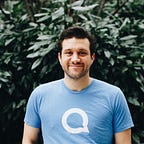The Personal Health Experiment: 3 Simple and Healthy Activities (Part 1)
In my post about Health OKRs, I talked about using OKRs to build a process for setting health objectives and measuring them against key results. Now I want to talk to you about the framework for setting up Personalized Weekly Health Experiments.
Personalized Weekly Health Experiments consist of 3 health activities to take you from where you are now to where you want to be in terms of health. The goal is to reach an ideal sustainable health state where being healthy is part of your identity.
Atomic Habits by James Clear
We can help you turn healthy activities into habits, and then to identify as a healthy, fit, active person who makes good health decisions. You’ll see yourself as someone with control over their personal health and the type of patient your doctor wishes she had more of.
This blog post is the first in a two-part series that shows you why “getting healthy” is often such a struggle, and how Personalized Weekly Health Experiments will get you the results you’ve been looking for.
3 Simple and Healthy Activities (Part 1)
We all agree that diet, activity, and sleep are the building blocks of good health. So if we’re sick-and-tired of how our bodies feel, we know what we should do: make changes to what we eat, how we move, and when we rest. And make those choices into our “new normal,” so we sustain greater health long-term.
It sounds simple enough. Why is it, then, that so many people struggle when they decide to get healthy?
Before I answer that question — and show you a method that works because it’s so personal to you — let’s dig a little deeper into the problem itself. There are three truths about improving health that you should know about.
- We’re all unique. Even twins react differently to the same foods (twin study). Yes, health is that complex. And without a clear feedback loop to make decisions, we are scrambling in the dark to know if this is working for us or not.
- We want things to be easy. Is Keto the way to go? Or is it intermittent fasting? Our culture promotes health as if it were a matter of finding and adopting the silver bullet. We’re trained to want (and expect) an easy answer. Often change that does work is not sustainable. But again, see #1.
- We want things fast. Humans are great at trying something once. We’re even great at testing something out for a few days or a week, but adopting a set of changes long enough that we’re doing them automatically? That takes over 2 months
This is what we’re up against. We could — and often do — spend months starting and stopping different methods. And in this process, we forget to consider some factors that are critical to sustainability.
- Can I do this? Sometimes we sign up for a gym workout we could barely make it to once, let alone three times a week.
- Do I like this? If you have an aversion to cooked kale, there’s no point forcing yourself to eat it — and even if you could force it, it’s not likely to be “good for you.”
Oversimplification of health and lack of personalization is why so many of us get stuck or overwhelmed soon after we decide to eat better, move more, and improve sleep quality. So how can we, once and for all, turn “getting healthy” into an action plan that works for us?
Let me introduce you to the Personal Weekly Health Experiment. Here’s how it works.
- Try a Healthy Activity X times over 7 days
- At the end of 7 days evaluate the Healthy Activity to make a decision on what to do next
- Continue this process until you have turned several Healthy Activities into Habits (Building a habit takes 3 to 4 weeks)
- Make habits like this into part of your identity:
- I go on long hikes
- I know what works for me to be healthy
- I am a runner
- I have a healthy lunch during weekdays with 1 flex day
- I have Ice Cream once a week
- Whenever I walk places
- I am hydrated
In the next post, I’ll dive deeper into what’s involved in the Personal Health Experiment’s 3-step, 7-day process. I’ll show you how simple and tailor-made for you these 7-day experiments really are.
More in Part 2: Designing an Experiment that Gets you Healthy
